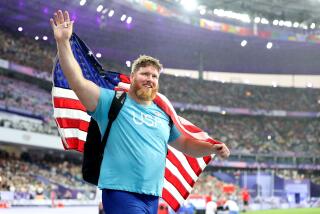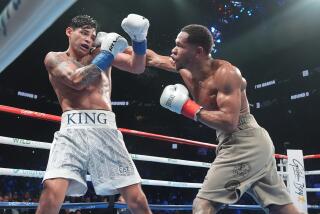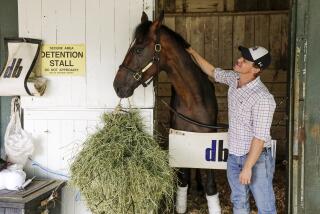Put Comes to Shove : Angry Barnes Will Return to Shotput Ring on Saturday
- Share via
On the road again, shotputter Randy Barnes arrived at the official hotel for Saturday night’s Sunkist Invitational at the Sports Arena, looked longingly around the lobby and smiled the sweet smile of contentment.
“Oh, yeah,” he said, “I’m home again.”
He was not referring to Los Angeles, although this city has provided him with three of his most memorable experiences--two world records and an earthquake. He was referring to the hotel, not that particular hotel, but any hotel where competitors are staying.
For the first time since the summer of 1990, he is one of them.
On Aug. 7, 1990, at Malmo, Sweden, according to the International Amateur Athletic Federation officials who govern track and field, Barnes tested positive for a banned anabolic steroid, methyltestosterone, a finding that he continues to dispute in court.
Since then, Barnes has served history’s longest two-year suspension, one that in reality has lasted 30 months.
Although he was eligible to resume competition last Aug. 7, his efforts to enter meets on last summer’s prestigious post-Olympic Grand Prix circuit in Europe were rejected by promoters.
Because the promoters also refused to offer invitations to U.S. shotputters Mike Stulce and Jim Doehring, they and Barnes suspected they had been blacklisted as a result of prior drug-related episodes.
Stulce served a two-year suspension that ended only a few months before he won the Olympic gold medal last summer at Barcelona, Spain, and Doehring, the silver medalist, had his suspension overturned because of mistakes committed during the administration of the test.
“It’s vigilantism,” Barnes said at the time.
In the six months since, it has become clear only that there was a concerted effort by the most prominent promoters to prevent the Americans from competing in Europe. The reason is
unclear.
“They told me that there had been a lot of editorials and cartoon caricatures in the European newspapers that related to the shotputters and their drug situations and that they were concerned Randy, Mike and Jim would get booed,” said Wayne Souza of Virginia Beach, Va., who represented Barnes and Stulce at the time and is still Stulce’s agent.
“I said, ‘They’re big boys--they can handle some boos.’ I told them, ‘They have fought for their innocence and served their time, and it’s not up to me as their agent or you as promoters to sit in judgment. The international governing body for track and field has done that.’ They listened and then told me that their shotput fields were full.”
Pete Petersons of Agoura, who now represents Barnes, said that the most powerful promoter, Andreas Bruegger of Zurich, Switzerland, told him last summer that “he didn’t want any controversy whatsoever” surrounding his meet.
“All the other promoters went along with Bruegger,” Petersons said.
But Souza has a theory about what Bruegger really wanted.
It revolves around Swiss shotputter Werner Guenthor, the favorite to win the gold medal at Barcelona who finished fourth behind Stulce, Doehring and Russia’s Vyacheslav Lykho.
“The European hero, Guenthor, got his clock cleaned in the Olympics, and his supporters, including Bruegger, got teed off,” Souza said. “He didn’t win at Barcelona, so they wanted to make sure he won the Grand Prix.
“When they would tell me that their field was full, I would ask, ‘Who’s in it?’ They would say, ‘Guenthor.’ I would say, ‘Who’s he going to compete against?’ They’d just give me this mumble business.”
Bruegger was not available for comment this week, but the former shotputter said last summer that it would have been unfair to Guenthor if the media in Zurich had focused on drugs, as the worldwide media did after the 1-2 finish by Stulce and Doehring at Barcelona, instead of performances.
The issue has been particularly frustrating to Barnes, because it has overshadowed the larger question of whether he should have been suspended in the first place.
There were so many valid questions regarding the paperwork associated with his drug test after a meet at Malmo that the IAAF appointed a five-man panel to study his case before reaching a decision. The vote was 3-2 that he should be suspended.
During the appeal process through The Athletics Congress, now known as USA Track & Field, another panel upheld the suspension only because Barnes was unable to prove his innocence. According to IAAF rules, the burden of proof rests with the accused, not the accuser.
“Under United States standards, it is inconceivable that a sample to be used as evidence against an accused person would have gone through the process that Mr. Barnes’ sample(s) went through and still constitute reliable evidence,” the USATF panel said in its opinion.
“Were the burdens (of proof) to be reversed, TAC could not establish, by clear and convincing evidence, that the samples tested were in fact the same given by Mr. Barnes.”
Neither USATF nor the IAAF relented until the suspension was completed, costing the 26-year-old shotputter two years of his career. Barnes, who repeatedly has denied that he ever took steroids or any other illegal performance-enhancing substance, has filed a $50-million civil suit against the track and field governing bodies.
Another U.S. world record-holder, quarter-miler Butch Reynolds, was suspended five days after Barnes, also because of a disputed positive test for steroids. Reynolds took his case all the way to the U.S. Supreme Court, earning the right to compete in last year’s Olympic trials while still under suspension, and recently winning a $27.3-million judgment against the IAAF in a U.S. federal court.
Barnes, who lost an attempt through the courts to compete in the Olympic trials, said in an interview last week that he was unable to aggressively pursue his case through the legal system during his suspension because of a lack of money.
But he is following Reynolds down the path of decrying the IAAF.
For Reynolds, that already has led to one further suspension and could lead to still another if he does not apologize for critical comments he has made and withdraw his legal action against the IAAF.
Barnes said he is aware that the IAAF might also move against him if he continues a campaign that officials believe is not in the best interests of the sport. But he apparently will take his chances.
“Their reliability is taken for granted, like they’re the clergy or something,” Barnes said of the IAAF. “But I want people to understand that they’re not credible and they’re not honorable.
“They have no concern for the lives they wreck. They’re not interested in the truth. They’re only interested in protecting their image.
“What they did to me was vicious. I can’t confirm they did it on purpose. The mistakes they made could have been an accident, but they tried to cover them up. That’s the only thing I know for sure, that there was a cover-up.
“I could be suspended for talking like this. I don’t want to be a martyr. I don’t want to be the death of myself. But I’m mad as hell.”
At the Sports Arena on Saturday night, in his first meet since the suspension ended, he could take out his anger on the competition, which includes three of the world’s top four shotputters in 1992, Stulce, Doehring and Gregg Tafralis.
Barnes, the Olympic silver medalist in 1988, has been successful before at the Sunkist. In 1989, a few days after an earthquake interrupted his training, the ground trembled again when he set his first world record, an indoor mark of 74 feet 4 1/4 inches that still stands. He also set the current outdoor world record in Los Angeles with a put of 75-10 1/4 during the 1990 Jack-in-the-Box Invitational at UCLA’s Drake Stadium.
But he has no illusions about winning Saturday night, and not only because his training partner at College Station, Tex., Stulce, had the longest indoor put, 71-5 1/4, in four years last Saturday in England.
“My workouts have been only fair,” said Barnes, who, at 6 feet 4 1/2 inches and 290 pounds has lost 10 pounds since 1990. “I’m trying to relearn my technique and orient myself to my event again. It’s going to take a meet or two to find out where I am.”
One place that he, Stulce and Doehring figure to be next summer is back on the circuit.
Stulce already has an agreement to appear in one European outdoor meet next summer, and Souza and Petersons said they have received assurances from other promoters.
“I’ve still got time to do the things I want to do in this sport,” Barnes said. “A shotputter doesn’t peak until he’s 30 or 32. I plan on being in Atlanta in ’96 for the Summer Olympics, and my goal is to break the world record again.”
His goal once was to become the first man with an 80-foot put. But he has learned in the last 30 months to take his life one day and one inch at a time.
More to Read
Go beyond the scoreboard
Get the latest on L.A.'s teams in the daily Sports Report newsletter.
You may occasionally receive promotional content from the Los Angeles Times.










